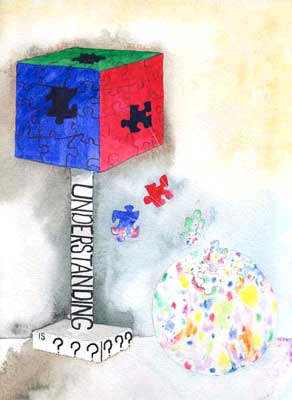
Questions, Intuitions, Revisions:
Telling and Re-Telling Stories About Ourselves in the World
A College Seminar Course at Bryn Mawr College

| Questions, Intuitions, Revisions: |
Good morning, friends. From Paul and me: here's the next question in our ever-evolving conversation about the nature of stories and the roles they are playing in our education. We'll be reading the first three chapters of Daniel Dennett's book, Darwin's' Dangerous Idea: Evolution and the Meanings of Life, for class discussion on Thursday. This passage comes from p. 22:
"There is no future in a sacred myth. Why not? Because of our curiosity. Because...we want to know why....we will never outgrow the question. Whatever we hold precious, we cannot protect it from our curiosity, because...one of the things we deem precious is the truth. The idea that we might preserve meaning by kidding ourselves is a pessimistic...nihilisitic idea...."
What do you think of Dennett's claim? What is your response to his statement?
Our very-probing conversation in class today about whether there's a "future in sacred myths"--the idea (in Dennett's words) "that we might preserve meaning by kidding ourselves"--led (among many other paths) to a conversation among the McBrides and me about free will, and whether acknowledging Darwin's "universally acidic" idea increases or decreases our awareness of same. You might want to check out a Serendip exhibit I've found very helpful, one that provides both an experiential and theoretical exploration of Free Will?--besides, it involves a game that's fun to play!
Enjoy break, all of you; I look forward to more free exploration when we return (rested?).
Anne
Name: Ginny Costello
Username: vcostell
Subject: Dennett
Date: 2003-10-16 23:12:49
Message Id: 6901
Comments:
Dennett's compelling work explores evolution through Darwin's theory of natural
selection. Volumes have been written in the attempt to define human existance,
but Darwin's explanation is a plausible one and enjoys resounding support in
most communities, scientific and otherwise.
However, some religious fundamentalist still disagree with the theory of evolution.
They are convinced that man was created by a supreme being called God.
Perhaps there is room for evolution and a higher power to somehow peacefully
coexist.
When I was a child I was taught the "Sacred Myth," but through education I began
to believe in evolution. Although, at times, the two theories co-mingle in my
mind.
The McBrides and I had another pretty-astonishing conversation yesterday. We lingered for what seemed forever over Emily Dickinson's poem about the "size" of the brain, working particularly the last stanza:
But that was only 1/2 the story. We spent the remainder of our class talking about the consequences of genetic testing (and related matters of manipulating the genome). Our conversation turned to the complexities, demands and uncertainties of decision-making in a world that is as unpredictable as the one Darwin-via-Dennett describes. I referred both to a conversation on the same topic which took place in the Graduate Idea Forum last week (which I make accessible here), and to a February 16, 2003 New York Times Magazine article, "Unspeakable Conversations," in which the disability rights activist Harriet McBryde Johnson describes a "civil discussion" with the Princeton philosopher Peter Singer "about whether she ought to exist."
You'll find one account of that article--and one-to-me-very-striking interpretation of it--in an archive from last year's discussion of The Culture of Science, where a group of us explored the notion that, as the world came to seem an increasingly uncertain place, a separate culture of science arose, as an attempt to create a "more certain place" to live and think. We thought then (and the idea was so resonant it still rings for me now) that, rather than trying to arrive @ the "view from nowhere"--the attempt to get a larger (more objective) perspective than that offered by one body/one brain--perhaps what is needed instead is the "view from everywhere": sorting through our shared views, not in order to strip away all that is personal, experiential and contextual, but rather to INCORPORATE the widest range of particular views, in order to discover what can be seen in common. (I also recommended to the McBrides that, instead of writing "position papers w/ proof," they write papers "exploring an idea and using a flashlight to describe the territory that is illuminated").
For more (much more) about the importance of getting all our views expressed (aka claiming what each of us knows experientially, in order to expand the views of us all) see also Making Sense of Diversity.
Thanks to all for making this a wider-deeper place for me.
Anne
| Forum
| Science in Culture
| Serendip Home |